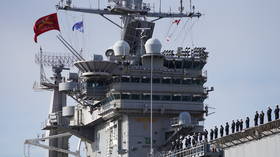US reveals change of plan for aircraft carrier group amid Ukraine crisis – reports

The Pentagon has ordered the aircraft carrier USS Harry S Truman, and other warships, to remain in the Mediterranean region rather than sail as previously planned towards the Middle East, Western news agencies claimed on Tuesday.
The reports cited an unnamed "defense official" who said the move was due to tensions with Russia over NATO expansion and Ukraine.
The carrier strike group was apparently ordered to remain in the Ionian Sea by Defense Secretary Lloyd Austin, according to AP, Reuters and others. It was originally expected to leave the area between Greece and Italy this week, to transit through the Suez Canal and to continue towards the Persian Gulf region.
The ships concerned includes the flagship Truman herself, the guided-missile cruiser USS San Jacinto and the guided-missile destroyers USS Cole, USS Bainbridge, USS Gravely and USS Jason Dunham. The American ships were deployed from Norfolk, Virginia on December 1 and reached the Mediterranean on December 14. The HNoMS Fridtjof Nansen, a Royal Norwegian Navy frigate, joined the group for the deployment.
The change of mission plans was touted as a measure aimed at "reassuring" European NATO members and partners amid ongoing tensions with Russia.
Since early November, Western media and governments have been accusing Moscow of conducting a build-up of troops in western parts of Russia, claiming such maneuvers could indicate an imminent invasion of Ukraine.
Russia has denied the allegations and said its troop movements were defensive in nature, and that military action would start in Ukraine only if Kiev and its foreign backers provoke it.
Amid the escalation, Russia’s President Vladimir Putin held talks with his US counterpart Joe Biden. Following the virtual negotiations, Moscow offered a package of security proposals to Washington and NATO, which it said could defuse the larger problem of Russia-NATO hostility.
The proposed measures include a freeze on NATO expansion, which Moscow perceives as a critical threat to its national security. Russia has long held that NATO is to blame for the resurgence of Cold War-like tensions in Europe, as the US-led bloc has ignored Russian concerns.
A series of talks between Russian and Western officials regarding European stability are scheduled to start on January 10.












